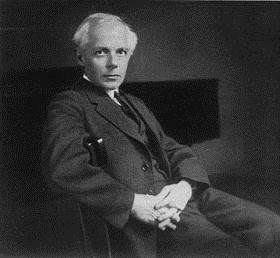|
Back
Let’s Make a Deal, Redux Miami
New World Center
04/27/2012 -
Belá Bartók: String Quartet No. 6, sz. 114, BB 119 – Duke Bluebeard’s Castle, op. 11, sz. 48, BB 62
Michelle DeYoung (Judith), Eric Halfverson (Duke Bluebeard)
Jeannette Jang, Vivek Jayaraman (violin), Anthony Parce (viola), David Mayer (cello), New World Symphony Orchestra, Michael Tilson Thomas (conductor)

B. Bartók
To many Miamians the idea of this program would have been unthinkable even twenty years ago. Bartók? In Miami? This city has really grown up. Florida Grand Opera scheduled
Bluebeard’s Castle on a double bill with Ravel’s L’Heure espagnole during the 2003–2004 season. Double bills are generally not good for box office and this plan fell through. Somehow though, the timing couldn’t be more perfect now. This is a two-character opera without a lot of physical activity which could easily be lost in cavernous theatres. But here in the New World Center it gets the necessary large orchestra with an intimacy that allows it to be experienced as the composer must have intended.
But unless one is a true devotee of twentieth century classical music, Béla Bartók has always been a bit difficult to grasp emotionally. His contribution to musical vocabulary is unquestionable but the works often feel remote. That is, except for Bluebeard’s Castle which can make for one of musical theatre’s most powerful evenings; yet it isn’t a Madama Butterfly or even Tristan und Isolde sort of exhaustion that one will experience. It is much shorter than either and sounds like no other, and don’t be surprised to find yourself getting sucked into the dilemma just as poor Judith does. Many people will go home afterwards and quickly jump into a cold shower if they don’t pass out first. Actually, passing out might be rather comforting because trying to fall asleep easily afterwards is something one mustn’t expect.
An unusually seductive piece, it starts out calmly but even then is rather menacing as we follow Judith on her search through her new husband’s house. We are as eager to have her unlock the next door as she is.
Those, like myself, who know this piece best from the Ludwig/Berry recording might find that Michelle DeYoung’s sound is brighter than we are used to. Always a magnificent physical stage presence, DeYoung was in fine form here after a bit of a shrill start. Judith is a mature woman who knows the rumors about her new man, whether or not she believes them. In fact, his background is certainly part of the attraction. Though Judith’s ending is not a happy one, neither Bartók nor DeYoung evokes pity; Judith seems to accept her fate after having resisted her new husband’s many warnings. Marriage metaphors abound but the theme is much broader to include anyone, friend or family member, invading someone’s most personal privacy.
Halfverson is a great Bluebeard. When they hear his huge sound, his small stature will seem incongruous to those unfamiliar with his work. The character becomes incredibly pitiable as he longs for someone who will love him unconditionally. Every time he caves into his wife’s requests, DeYoung’s gleaming smile is another blow to Bluebeard’s already shaken sense of self-worth. If one is to forget the greatness of Bartók’s imagination and directness, this opera has a giant of a libretto that goes where few works ever dare.
But for many, the music is why we are here; and what an orchestra! The stage action is performed on a platform above and behind the orchestra that is usually used for additional seating; the orchestra becomes an uncovered pit. Yet the singers, especially Halfverson, demonstrate little inability to cut through the enormous sound. The projections on screens high above the orchestra show us what Judith sees as she enters the castle and unlocks each door. Usually the images start out innocuous or beautiful but before she leaves one can understand her growing apprehensions about the circumstance in which she has found herself. The sounds of the orchestra are as severe and colorful as anything that is visually provided. Intense beauty in the winds, necessary dissonance in the strings, and a strange allure offered by the harps take us to a place we have never been before in musical theatre. But everything, thanks to Michael Tilson Thomas’s subtle approach is all of a piece allowing predominance of no element.
The evening began with Bartók’s String Quartet No. 6. These are the works that set apart the wannabes from the pros. Musicians don’t go near this sort of work unless they are sure of themselves. Violinists Jeannette Jang and Vivek Jayaraman, violist Anthony Parce and cellist David Mayer demonstrate complete command of this material. This is not the sort of work that has a consistent melodic line to embrace. Instead, the musicians succeed only by their intense concentration and musicianship. Each movement starts similarly with a haunting phrase which is taken into such varied territory as gypsy and folk music as it explores humor, passion, and ultimately sadness. The audience’s passionate reaction to this demanding work is encouragement for South Florida’s musical scene.
Jeff Haller
|